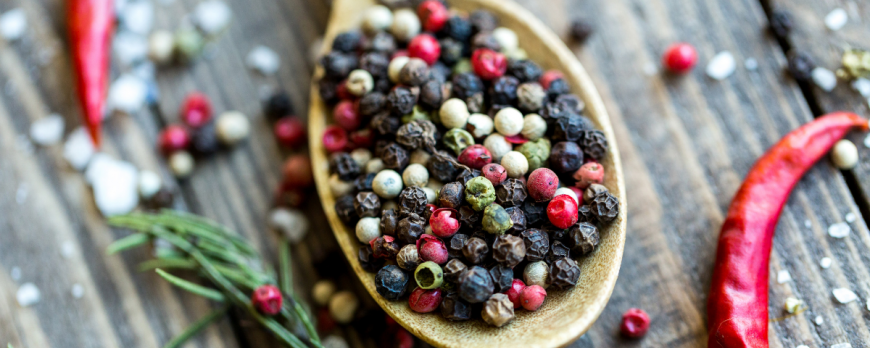
Pepper - A spice with many nutritional virtues
We're currently professionally translating all content. In the meantime, this article has been translated by Google Translate. Sorry if this isn't 100% relevant.
"The salt of existence is essentially in the pepper that is put there. "Alphonse Allais.
Pepper has many virtues:
# 1 It helps digestion and reduces flatulence.
# 2 It is also shown to have an aphrodisiac effect. It can indeed cause a micro-vascular dilatation on the sexual organs, in particular in the uterus of the woman
# 3 It would have a direct effect on endomorphins and piperine naturally increases serotonin levels; in fact, in a few words, it makes you happy and serene!
# 4 Pepper contains many minerals, trace elements and vitamins, including potassium, calcium, magnesium, phosphorus, iron, manganese, zinc, copper, selenium, iodine, vitamins: E, A, B1, B2, B3, B6, B9
# 5 Piperine and pepper fat will increase the uptake of antioxidants such as vitamin C, coenzyme Q 10, turmeric, beta carotene, selenium, and more.
And some tips:
Nutritional value of pepper
100 grams of pepper contain about 255 Kcal, of which:
- carbohydrates: 44.5 g
- proteins: 15.95 g
- fat: 3.26 g
Pepper contains many minerals, trace elements and vitamins, including: potassium, calcium, magnesium, phosphorus, iron, manganese, zinc, copper, selenium, iodine, vitamin E, A, B1, B2, B3, B6, B9.
Pepper has many virtues:
# 1 It helps digestion and reduces flatulence.
# 2 It is also shown to have an aphrodisiac effect. It can indeed cause a micro-vascular dilatation on the sexual organs, in particular in the uterus of the woman
# 3 It would have a direct effect on endomorphins and piperine naturally increases serotonin levels; in fact, in a few words, it makes you happy and serene!
# 4 Pepper contains many minerals, trace elements and vitamins, including potassium, calcium, magnesium, phosphorus, iron, manganese, zinc, copper, selenium, iodine, vitamins: E, A, B1, B2, B3, B6, B9
# 5 Piperine and pepper fat will increase the uptake of antioxidants such as vitamin C, coenzyme Q 10, turmeric, beta carotene, selenium, and more.
And some tips:
- A little trick to judge its quality: We recognize a pepper quality by its fat. By crushing a grain on a sheet of paper, a trace of grease should appear if it is of quality!
- Try adding pepper on your strawberries. Their taste will come out even more!
- Be careful to grind it at the last moment, so that it can fully develop its aromas.
Nutritional value of pepper
100 grams of pepper contain about 255 Kcal, of which:
- carbohydrates: 44.5 g
- proteins: 15.95 g
- fat: 3.26 g
Pepper contains many minerals, trace elements and vitamins, including: potassium, calcium, magnesium, phosphorus, iron, manganese, zinc, copper, selenium, iodine, vitamin E, A, B1, B2, B3, B6, B9.
Posté le
07/29/2019
0
Laissez un commentaireRépondre
Vous devez être connecté pour poster un commentaire.
Recherche sur le blog
Blog categories
